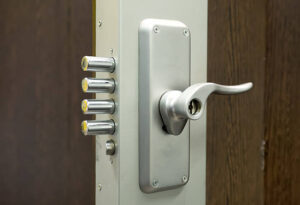Why Restricted Keyways Offer Superior Protection
When it comes to high security door locks, restricted keyways are the unsung heroes. You might be thinking, “What’s a keyway?” Well, it’s that slot where you insert your key. But not all keyways are created equal.
Picture this: You’re at a hardware store looking for a new lock. There’s an array of options and each promises top-notch security. However, most standard locks can be easily duplicated by anyone with access to basic tools or services like those offered at any corner shop locksmith. That’s where restricted keyways come into play.
Restricted keyways have specific designs that prevent unauthorized duplication of keys. Think about it as having an exclusive club membership card—only certain people can get in, and there’s no easy way to forge one without proper authorization.
Imagine losing your house keys and worrying if someone could make copies from them? With standard keys, that’s a real concern! But with restricted ones? Not so much! The only place you can duplicate these is through authorized dealers who maintain strict records on every copy made.
Here’s another scenario: A busy office building has multiple entry points requiring various levels of access control for different employees. Using restricted keyways means management doesn’t have to worry about rogue duplicates floating around causing potential breaches in security protocols.

Let me tell you about my friend Joe who runs a small business downtown—a coffee shop buzzing with customers day-in-day-out! One night after closing up he realized his spare set was missing from its usual spot behind the counter (I know right?). Panic set in until he remembered those were actually part of his newly installed high-security system featuring—you guessed it—restricted-keyway technology!
Joe breathed a sigh of relief. His restricted keyway locks meant that even if someone found his keys, they couldn’t just waltz into any locksmith and get copies made. It’s like having an extra layer of armor around your property.
Now, let’s dive deeper into why these locks are such game-changers. For starters, the design itself is often patented. This means manufacturers control who can produce and distribute the keys—making unauthorized duplication nearly impossible. Imagine trying to replicate a secret recipe; without access to all ingredients and instructions, it’s not happening!
But there’s more! These locks also boast intricate internal mechanisms that resist picking and bumping—a common technique burglars use to gain entry quickly and quietly. Standard locks? They’re about as secure as using a paperclip in comparison.
Ever heard of lock snapping? It’s when intruders break the cylinder to manipulate the lock mechanism directly—sounds terrifying right? Restricted keyways typically come with reinforced cylinders designed specifically to thwart such attacks.
Think about large institutions like hospitals or universities where security is paramount yet needs constant monitoring due to high foot traffic daily—they swear by restricted keyways for good reason! Each department might have different access levels but maintaining overall building integrity remains uncompromised thanks largely due this advanced locking system’s capabilities.
Mastering the Art of Restricted Keyways for Your Property
Ever had that nagging feeling about your property’s security? Investing in high security door locks can give you peace of mind. But, have you ever thought about restricted keyways? They’re like having a secret handshake—only certain people know it.
Restricted keyways are special types of keys and locks that offer enhanced protection against unauthorized duplication. Think of them as VIP passes to your property. Only specific locksmiths or manufacturers can create copies, which makes it much harder for someone to make an extra set without permission.
So how do you get one of these fancy systems installed? First off, find a reputable locksmith who specializes in high-security solutions. These pros often work with manufacturers who produce restricted keyway systems. You’ll need to show proof that you’re the rightful owner before they even think about cutting a new key for you.
Once you’ve got your hands on this sophisticated system, managing it is another ball game altogether. It’s not just about holding onto those keys like they’re gold (although that’s part of it). Record-keeping becomes crucial here. Jot down every time a new key is issued and keep track of who has access to what areas.
A good trick I learned from my old boss: color-code your keys! It sounds simple but trust me; it’s effective. Red could mean ‘Top Secret’ while blue might be ‘General Access.’ This way, at a glance, you’ll know exactly which doors each person can open.
Let’s talk maintenance now because even top-notch systems need some TLC (Tender Loving Care). Regularly check the condition of both locks and keys—no one wants their secure lock failing due to neglect! Lubricate them occasionally but use products recommended by professionals; household oils won’t cut it here!
Here’s something funny—I once tried using cooking oil on my front door lock after reading some DIY tip online… Let’s just say I ended up calling my locksmith friend in sheer embarrassment when the whole thing jammed!
Communication also plays an essential role in managing these specialized systems effectively. Make sure everyone understands the importance behind why such measures exist—not just treating them as annoying hurdles they must jump through daily.
Now, let’s dive into the nitty-gritty of key control. Have you ever had a moment where someone lost their keys and it felt like the end of the world? With restricted keyways, this scenario is less dramatic but still critical. Establish a clear protocol for reporting lost or stolen keys immediately. This isn’t just about inconvenience; it’s about maintaining your property’s security integrity.
Another handy tip: periodic audits. Schedule regular checks to verify that all issued keys are accounted for and being used appropriately. You might feel like Sherlock Holmes sleuthing around, but these audits can uncover potential issues before they become real problems.
Let’s not forget about technology either! Modern systems often come with digital tracking options that let you monitor who accessed what and when—no more guessing games! It’s like having eyes everywhere without being creepy.
One time at my friend’s office, they installed such a system after an incident involving misplaced keys led to unauthorized access. The new setup allowed them to track every entry point in real-time through an app on their phones—talk about peace of mind!
And hey, while we’re on this journey together, remember that flexibility is crucial too. As your needs evolve (maybe you expand your property or hire new staff), so should your security measures adapt accordingly.






